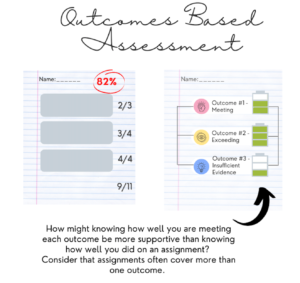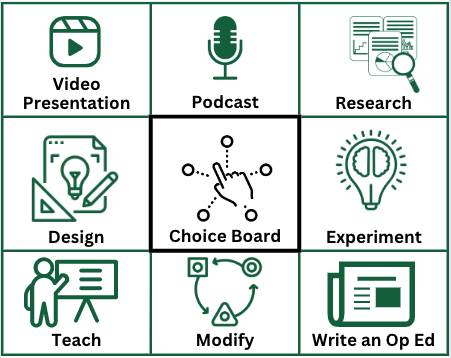Assessing Outcomes versus Grading Assignments

Shift your focus from grading tasks to assessing outcomes. Learn how this approach fosters deeper learning and provides a more meaningful evaluation of student progress.
In this article, we will examine why assessing outcomes can target learning improvements better than grading assignments.Ooutcomes-based assessment starts with articulating what students will be able to do (the learning outcomes), followed by designing learning activities and assessments linked to the outcomes. However, even with clear outcomes and learning activities, instructors often fall into the habit of grading assignments rather than assessing outcomes.
Consider the following scenario. Learner 1 and Learner 2 both have 75% in your class. How do you, the instructor, or the employer know whether they gained 100% competency on 75% of the material or 75% competency on 100% of the material? The distinction is important when determining what skills or knowledge a learner has.
Allowing Multiple Opportunities to Meet Course Outcomes
Another component of outcomes-based assessment is that learners have opportunities to gain feedback and improve their learning before a high-stakes summative assessment. Assessments from the learning opportunities are not averaged together, rather emphasis is placed on the student’s competency at the end of the course. Let’s look at the example of starting an IV. We wouldn’t average the score a person received the first time they tried to start an IV with the last time. There will be a lot of learning and feedback between the first and last attempts.
Focusing on the Areas that Need Levelling Up
The aim of many education programs is to have the learner demonstrate that they can meet the stated outcomes. With this in mind, when the outcomes within assignments are assessed, creating learner-centred opportunities becomes clearer. For example, if in a course a student has evidence of meeting an outcome, it might be a better use of the student’s time to focus on the areas they need to increase their knowledge or skills. Perhaps having the student choose a project that focuses on improving other outcomes would be a better option. Let’s look at obtaining a driver’s licence as an example. As a driving instructor, once I observe that a student can consistently parallel park, it wouldn’t make sense to repeat parallel parking each time we go out to drive, specifically if there are other skills the student needs to improve upon, like coming to a complete stop at an intersection. In this way, outcomes-based assessment is inherently student-focused, not assignment-focused.
Where can you start?
- If you use Quizzes in Canvas you can attach banks of questions to outcomes in your course. See the video at this link.
- Create rubrics with separate lines for each outcome in an assignment.
- Clarify the outcomes included in each learning activity.
- Assess the learning activities included in your courses to determine if they are all aligned with your outcomes. Are there items you might be assessing that are not related to the outcomes?
If you have questions about outcomes-based assessment and would like to know where to start, please reach out to us at the gmctl@usask.ca
Image© 2021 by Racquel Biem is licensed under CC BY-NC-SA 4.0


